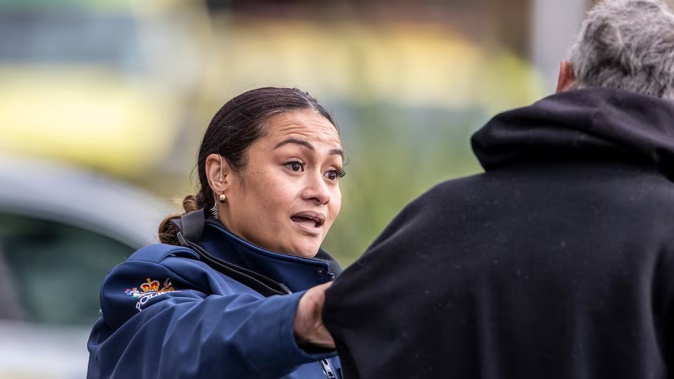
New community police teams will be established in major cities across New Zealand targeting anti-social behaviour and crime.
The new initiative was announced by Police Commissioner Andrew Coster today, with Auckland CBD being the first to benefit with the announcement of additional police presence and Operation Safer Streets.
Coster said the new Community Beat Teams will provide a more visible, reassuring and responsive policing presence on main streets, shopping malls and transport hubs.
Today’s announcement follows growing concern among CBD residents and retailers about crime rates and antisocial behaviour.
There have been repeated calls for more police on the streets in downtown Auckland and for a dedicated CBD police station to combat the problem.
Speaking to media this afternoon, Prime Minister Christopher Luxon said Luxon retail crime was a major issue in central Auckland.
“First we need to ensure police are highly visible,” he said, as part of the plan to tackling crime.
The beat teams will be staffed from additional constabulary officers confirmed in the 2024 Budget, he said.
“This is the start of a staged two-year roll out, which will see 63 additional staff deployed in new Community Beat Teams across Auckland’s three policing districts, 21 in each, 17 in Wellington and 10 in Christchurch.
“We know communities want to see more police out and about, particularly in those areas experiencing challenges with anti-social behaviour and retail crime.”
The 21 additional police staff to be based in Auckland CBD will provide further support in the busiest spaces, from Karangahape Rd, to downtown and along the Viaduct.

Police Commissioner Andrew Coster. Photo / Mark Mitchell
This will grow the existing Beat Team to more than 50 staff in the CBD.
“Our intent is to move to a 24/7 beat model in the CBD, working on a rostered basis with five teams, each led by a Sergeant, to increase police visibility around the clock,” Coster said.
“Increased visibility deters crime and encourages a sense of safety through positive engagement with the public and business owners.
“Community Beat Teams, alongside our existing response, prevention and investigation staff, will continue to deploy to areas of high demand.
“Crime trends have changed in recent years with more anti-social behaviour and public place crime and we’re responding by changing our deployment patterns to increase visibility and community reassurance.”
Coster said crime in Auckland central city was now starting to trend down but but recent incidents have rightly caused concern.
“That’s why today we are also announcing Operation Safer Streets, an intensive deployment operation to target anti-social behaviour and crime in the CBD,” he said.
This operation will continue until the new Community Beat Team is fully established and embedded.
Police regularly meet groups such as the K Road Business Association, Heart of the City, Auckland Council, as well as elected representatives and residents’ groups.
“Most of the issues we’re facing in Auckland CBD are complex and can’t be solved by police alone,” Coster said.
“It’s vital we continue to work with partner agencies and other groups invested in Auckland’s success.”
Future decisions about the allocation of the 500 will be made in due course.

Police Minister Mark Mitchell said we couldn’t ignore how escalating crime had made the jobs of police officers more difficult. Photo / Andrew Warner
Police Minister Mark Mitchell welcomed the announcement, saying it couldn’t be ignored how escalating crime had made the jobs of police officers more difficult.
“Kiwis are utterly sick of the crime and antisocial behaviour in our biggest city,” Mr Mitchell said.
“Nobody should have to fear walking down Queen St, or constantly worry when their business will be the victim of retail crime.”
Associate Police Minister Casey Costello the 500 additional police the Government was delivering would significantly extend their capabilities and visibility, “which is exactly what Kiwis want”.
“Nobody should ever have to fear for their safety in our cities. But criminals should certainly fear the consequences of crime.”
Heart of the City chief executive Viv Beck has been lobbying for more police in the CBD for several years.
Heart of the City chief executive Viv Beck welcomed the announcement to boost police presence in the city centre and anticipated work to continue on a longer-term solution.
”After more than three years of intense lobbying, we are very pleased the city centre is now high on the agenda for increased resources, both from police and other agencies,” Beck said.
”Reported crime is trending downwards and while there is still a way to go, we are optimistic that more front-line police starting from 1 July will bring a further reduction and complement local safety initiatives in place.”
Beck said that as well as extra police on the beat, there remained a desire by many in the community to see the return of a downtown police station.
Hospitality New Zealand is partnering with police to offer a workshop for central Auckland hospitality businesses to provide them with practical advice on safety and crime prevention.
The workshop planned for July 1 at SkyCity is expected to be attended by about 100 business owners, and is aimed at offering an opportunity for businesses to voice their concerns.
”Hospitality NZ has recently established an Ethnic Advisory Group to better advocate for ethnic hospitality businesses and address their pressing issues,” said chief executive Steve Armitage.
”One of the main issues this group has shared with us is the growing concern hospitality and accommodation businesses have around perceptions of safety and crime in the central city.”
Armitage said the police Ethnic Services Team will be be outlining effective crime prevention strategies and responsive measures for businesses to put in place.
Take your Radio, Podcasts and Music with you









